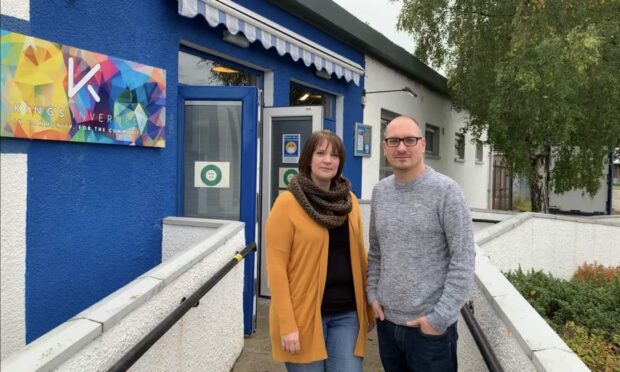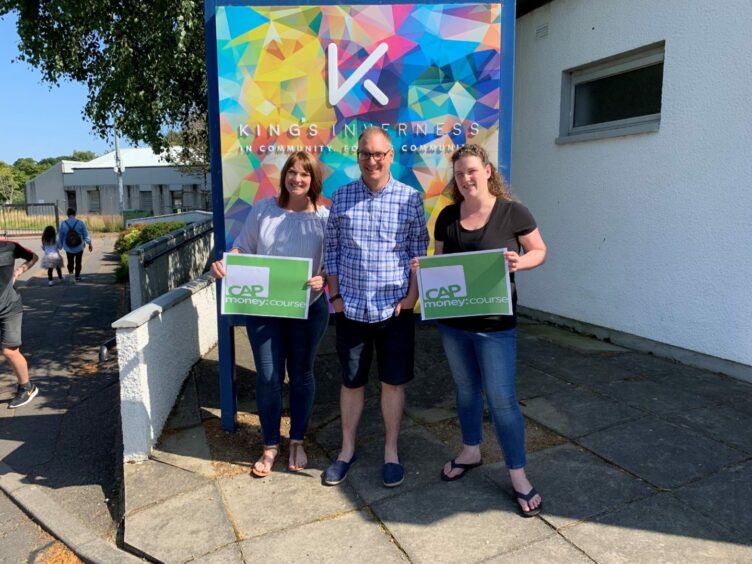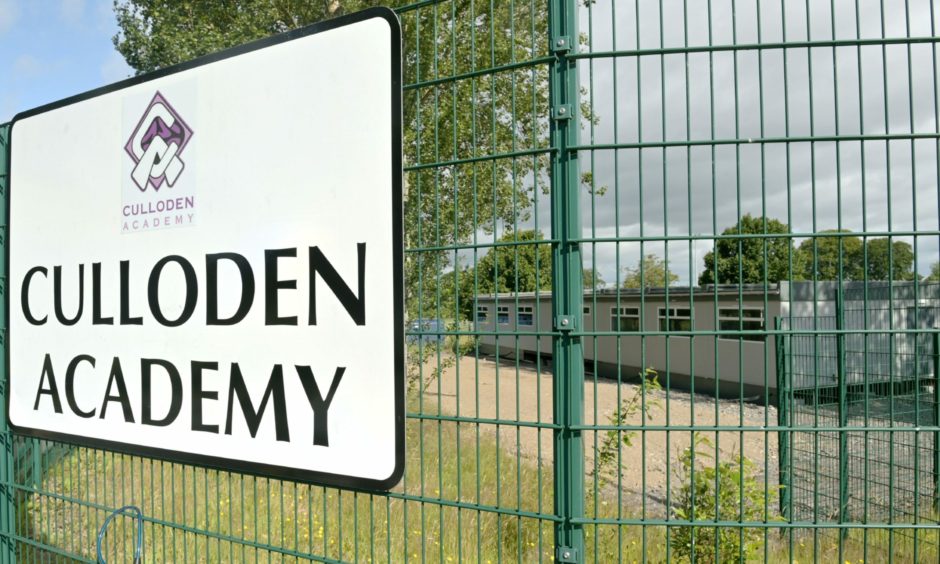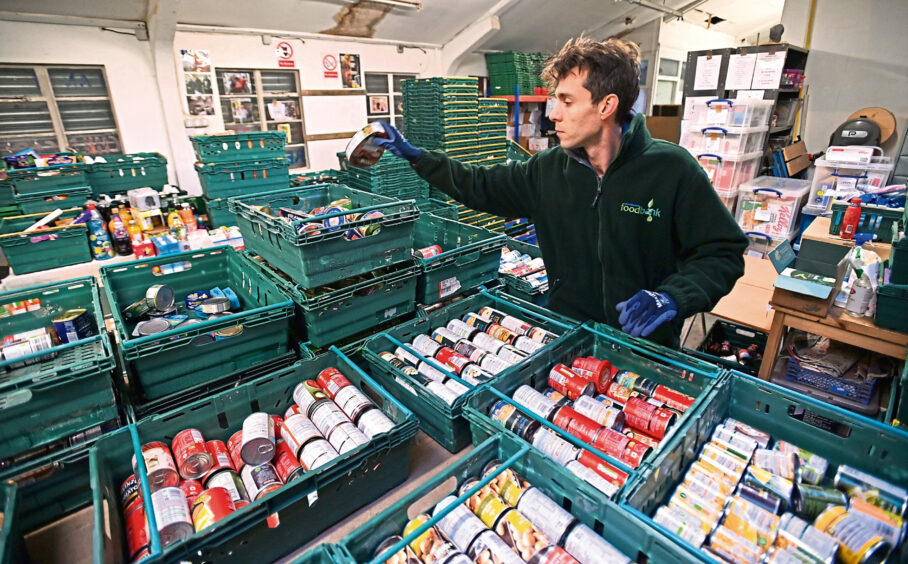Christians Against Poverty (CAP) is running money sessions for school pupils across Inverness.
They say kids are well aware of the financial challenges families face, and it’s never too early to start setting good habits.
With that in mind, Chris and Sarah Dowling travel across the city teaching pupils how to manage their money.
‘People were crying in the office’
Chris is Inverness chairman of Developing the Young Workforce (DYW), and joint managing director of Cairngorm Group. As an employer, he has witnessed the impact of money worries on his own team.
“One of the biggest staff issues we have had to deal with is personal debt,” says Chris. “We were having issues 12 years ago where we had some quite tragic stories – people didn’t know where to turn, or started crying in the office. A credit card bill would come in that they didn’t know what to do with, or they’d fallen behind in their rent. That was my route into it.
“From a DYW angle, it made me realise that getting a young person into a job isn’t the end of the story. Teaching them what to do with their first pay packet is a step beyond that. All my different roles came together.”
Pause and reflect
Chris and Sarah got involved with Christians Against Poverty (CAP) through their local church. To start with, the Inverness money sessions were aimed at adults.
“You put together a budget, based on three main principles: cut costs, cut back or cut out,” says Sarah. “It was amazing how many people had never done this.”
The Christians Against Poverty money course helps adults and young people to understand how to set a budget, and where to get help if they need it.
Chris and Sarah say many people only look at their money when there’s a big change, like a new job or a new house. They were guilty of it themselves: Chris says they’d been married for 10 years when they started working with CAP, and then reviewed their finances in detail. “It’s helpful to pause,” he says.
If money coaching isn’t enough to help, people can self-refer to the CAP debt centre in Inverness.
The adult sessions were going well, and then a chance conversation introduced a whole new dimension. Chris and Sarah were preparing to attend a training session in Cardiff, and mentioned their trip to a Highland Council officer who worked in youth employment. She told them “This is exactly what we’re looking for.”
Shatter the stigma: Encouraging open conversations about money
Chris and Sarah got to work adapting the CAP resources to suit a young audience. They’re now delivering sessions for new pupils just beginning S1, and more involved budgeting sessions for senior pupils.
CAP works with most secondary schools in Inverness, though some have their own alternative arrangements in place. Millburn and Culloden Academy both regularly host the sessions, and Chris and Sarah find the pupils quickly engage with the subject.
“Just this morning we asked pupils what their household spends money on, and they all spoke about the cost of gas and electric,” says Sarah. “It was very much at the forefront of their minds. It’s all over the media so it’s what gets talked about in the house.”
Chris adds that the school strike closures have also played a part. “We have a son in S4 and I’m surprised at how open the teachers have been in discussing the strikes. They’re explaining why they feel they have to strike, and that they’re struggling.”
One of the main aims of the money sessions is to encourage just those kinds of open conversations. There’s still a taboo around talking about money, but Chris and Sarah believe it’s important to introduce language around money at a young age, and shatter the stigma around poverty.
Introducing Sam, his cash – and his relationship cliff hanger
For S1 pupils, the money sessions centre around the fictional character Sam, who is just starting out at college. Sam has mounting expenses and if he keeps spending beyond his means, he’ll soon land himself in debt. “It’s about helping pupils understand the consequences of overspending,” says Chris.
There’s one unexpected consequence that always raises a laugh. “Sam has a girlfriend who lives far away, so he spends a lot of money on travel to see her,” explains Sarah. “When the kids talk about saving Sam money, the poor girlfriend gets dumped every time!”
Creating a fictional character clearly helps young people to engage with the subject in a non-threatening way.
For older pupils in S5 and S6, there are real life challenges, such as planning a holiday on a tight budget.
Culloden pupils request more information on money management
At Culloden Academy, financial literacy has become a core part of their personal and social education classes.
“The CAP sessions are a good chance to talk about money and budgeting, as PSE is traditionally more focused around health and wellbeing,” says Culloden Academy teacher David Munro. “We recently completed a pupil review of our PSE programme and pupils actually said they wanted to know more about finance.”
With that in mind, the school’s DYW co-ordinator Morven Walker is working on an expanded finance programme. Local law firm Harper Macleod has spoken to pupils about rent and mortgage costs, laying out the reality of independent living. The school also had a visit from the Trade Union Council, which set out workers’ rights and fair pay.
“With the cost-of-living crisis, we’re keen to support pupils as much as we can even after they leave school,” says David. “Forty percent of our pupils go into employment and we want to make sure that’s at the right level, and we’re helping them to raise their aspirations. It’s important they think beyond the next couple of years and start to plan for their future.”
‘We can all do our bit’ to survive cost-of-living crisis
Scotland’s new curriculum puts a strong emphasis on teaching kids to be responsible citizens, and that includes a rich understanding of the wider world.
Chris and Sarah work closely with the churches in their local area, and say they’ve witnessed a shift in attitudes. This includes a bigger interest in the environment, and collective action.
This shift is reflected in the work of Inverness schools, too. The P&J recently reported on Crown Primary School, and its efforts to support local parents and play a part in the community.
Sharing sheds are popping up all over the country, and offer a different approach to food banks.
“The Barn Church run a community fridge,” says Chris. “What’s interesting about that is a couple of years ago Blythswood tried to run a food bank out of Culloden library, but it didn’t work out. With The Barn community fridge, the pitch is food recycling. It’s really meeting the same need, just with a different label. And it’s really popular now.”
Sarah agrees. “It’s shifting that perspective. People donate to it too so there’s a reciprocal thing, focused on food waste and the environmental impact.”
Local churches say they’re seeing more working people struggling with money, and they don’t want “something for nothing.”
For example, Smithton free church runs a successful food night, offering four hot dogs or burgers for £1. The profits go to helping people in Ukraine. Yet Chris said their own attempt at a free food night “bombed”.
“It’s reframing it as a social and community thing,” Sarah observes. “People don’t want to be seen to be accepting charity. It’s not a hand out, people have a dignity in this, and we can all do our bit.”





Conversation